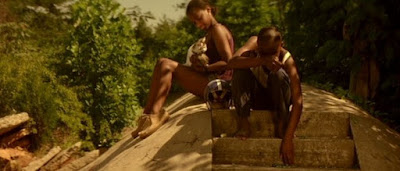
Duck Amuck
d. Chuck Jones, 1953
A lot of great films have been made about making movies. There's what is probably the best, Federico Fellini's 8 1/2. Other great ones include Jean-Luc Godard's Contempt, Ingmar Bergman's Persona, and to some extent Jean Cocteau's Blood of a Poet, which applies to all artists.
Then there's Chuck Jones' 1953 short animated film, "Duck Amuck." And though it may be one of the most famous cartoons of all time (if only because it stars Daffy Duck talking directly to the screen), I don't believe it gets the recognition it deserves for masterfully dissecting the cinematic art.
In it, Daffy Duck argues with the artist about the expectations of a film. At first, he is seen riding a horse dressed up as a knight. When the setting is changed, Daffy Duck gets angry and the timeless monologues to the screen begin. Whenever Daffy Duck adapts to the new setting, the artist decides to change it.
In less than 7 minutes, Chuck Jones and his writer Michael Maltese are able to explain the nature of cinema and its possibilites in such an apparent way that it seems almost too simple. The message I get by the end of the film is that movies work at their best when they are not tied down by a story (a perfect statement for an animator to make), but instead when it indulges in its endless possibilities. Would you rather see Daffy Duck and Bugs Bunny in some heightened and predictable melodrama, or in a surreal setting plotting ingenious shenanigans? I thought so.
Of all the Looney Tunes cartoons, the ones by Chuck Jones are the best ("Duck Amuck" is probably my favorite). Another two that I have rewatched recently are "One Froggy Evening" (1955) and "What's Opera, Doc?" (1957), all three are part of the National Film Registry for preservation in the Library of Congress.
In "One Froggy Evening," Jones and Maltese tackle the issue of greed through the ages in an ingenious way, as they did to the cinema in "Duck Amuck." "What's Opera, Doc?" is very famous for its use of Wagner (topped only by Coppola's Apocalypse Now) and everyone has probably seen it, and it provides a great arguement about how the only way for a "story" to be effective on film is by leaving it behind and focusing on finding originality within those themes, everything else is superfluous.
Watching "Duck Amuck" today is a testament to its own brilliance. It's a 7 minute cartoon made more than 50 years ago. And yet, it is as entertaining, ingenious, and lovely as basically any other film.













